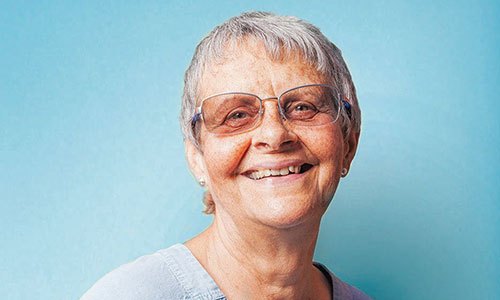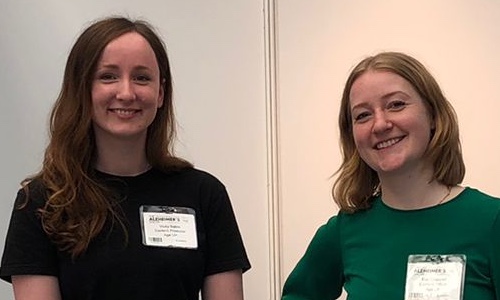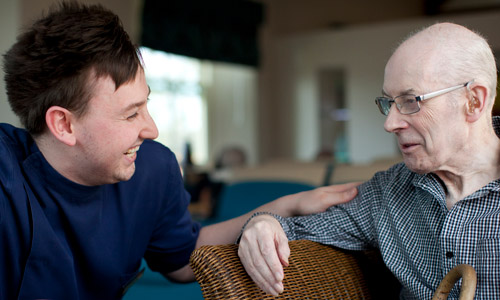Wendy Mitchell has now written her second book on life with dementia, 'What I Wish People Knew About Dementia'. In our interview, Wendy discusses changes to her life since her first book, appreciating time, and social media as a tool for escapism.
The last time Age UK spoke to Wendy Mitchell, in March 2019, it was to discuss her memoir, ‘Somebody I Used to Know’, which dealt with her diagnosis, aged 58, of early-onset Alzheimer’s and the beginning of her “new life”. Almost three years on, Wendy admits she didn't think she’d get to write this second book, which combines her own experiences with research to challenge the many misconceptions out there. “I never imagined the first book would exist, so to have a second is the icing on the cake.”

Pic: Jo Hanley
Choosing the glass half full
Much has changed for Wendy during that time. “I never concentrate on my losses,” she explains. “The list of what I can’t do anymore is probably very long, but I don’t dwell on that.” Mindful this information is helpful to others, however, Wendy explains a few of the more obvious changes, specifically around eating and drinking.
She’s no longer able to use a knife and fork, for instance, because she struggles to coordinate between right and left hands, so uses a spoon with a fork instead. Visually, Wendy now struggles with contrast, meaning she’s unable to see and interpret white foods, such as mashed potato or rice, against a white plate.
Even more critically, Wendy’s relationship with food and drink has long since changed. She no longer feels hungry or thirsty as she used to. This is one of the areas she thinks people misunderstand the most. A person may see a loved one not eating and think they’ve forgotten, and while they may have done, it may also be that they no longer experience the desire to.
Someone may not know when to encourage someone to drink, thinking the other person isn’t thirsty, which could put them at risk of dehydration. Reminders can therefore be very important. Despite having two grown up daughters, Wendy is determined to stay living alone, so takes steps to maintain that independence. “I have to put things in place, such as reminders to eat and drink.” Years after losing the enjoyment of sitting down and having a meal, she now views food as the fuel that enables her to go on her beloved walks.
Wendy’s daily walks give her the chance to experience the things that her “new life” has given her greater appreciation for — the first of them being time. “In my working life, I was as guilty as anyone else of wishing for the weekend or the next holiday,” she explains. “Now there’s nothing I enjoy more than walking in my village and just looking at things that, if you blink, you’ll miss. People out for a walk, chatting, will miss a beautiful robin singing in a tree. For me, those are joyous moments.”
Pre-diagnosis, in her work as a busy NHS manager, Wendy had travelled up and down the country giving talks, with no two days being the same. Since her diagnosis, however, routine has become incredibly important, which made the coronavirus pandemic and its restrictions a difficult time. “I suddenly lost my purpose. I didn’t understand what I could do anymore. It was very disorientating and discombobulating.”

There’s nothing I enjoy more than walking in my village and just looking at things that, if you blink, you’ll miss.
The benefits of social media
Thankfully, just before lockdown, Wendy got a camera and concentrated on establishing a new routine whereby she took photographs in order to get to know her village. She shared her pictures of the buildings, flora and fauna she comes across on the village’s Facebook page. “People were able to see my talent before they knew I had dementia. They saw me as a person first, before a person with dementia, which was comforting.”
Wendy is particularly fond of Twitter, on which her account has just shy of 16,000 followers. “I’m a Twitterholic,” she says of a social media platform that, with its constant rush of information and disjointed conversations, you’d think might be a hindrance to someone with dementia.

“It’s a help to me. I don’t try to keep up with everything, that would be overwhelming, so I just focus on one post at a time. People are restricted in the number of words they can say [on Twitter], so they have to be concise. If you were allowed to waffle, I wouldn’t like it because I wouldn’t be able to keep track of it. Also I can type as though dementia hasn’t entered my world, as that part of my brain hasn’t broken yet. Twitter is my escape from dementia and enables me to talk to everyone.”
What I Wish People Knew About Dementia
Wendy is addressing the world directly with What I Wish People Knew About Dementia, which takes a different approach to her first book and its memoir style. “I wanted to show dementia in more depth, but I also didn’t want it to be all about me. I came under criticism after the first book because it was specifically about how dementia had affected me, which isn’t the same for everyone. So I wanted to allow other people to have a voice in this book, to show the public that it’s not just me living like this, it’s other people. And yes, we’ve got similarities, but we’ve also got differences. The biggest driving force, though, was to tell people once again that dementia is about so much more than memory. If you focus on that one area with your loved one living with dementia, then you’re missing out on so many other elements.”
Interviewing other people living with dementia for the book showed Wendy that no one with dementia should be alone and unable to have access to the comfort that comes with access to people with similar experiences. “There’s nothing more comforting than hearing that one phrase ‘That happened to me’ — and no one judging, no one questioning, no one doubting. It’s the only situation in which I feel comfortable being myself, because in any other situation I feel looked at and scrutinised.”

If you focus on [memory] with your loved one living with dementia, then you’re missing out on so many other elements.
Never say never
This morning, Wendy received an email from a woman who told her reading her book meant she wasn’t fearful of her own dementia diagnosis. “I can’t tell you how heartening that is,” smiles Wendy. “It makes all of the bad days worth it. That makes my heart swell, it is so humbling.”
Would she consider another book, then, given how much comfort her work has brought others? “I’ve learned to say ‘Never say never’. Anna [Wharton, who co-wrote Wendy’s books] reminded me that when we wrote the first book I’d said ‘I might not be here for any more’. And now there’s a second book. I will go on writing as long as my brain and fingers can type.”
What I Wish People Knew About Dementia is out now via Bloomsbury Publishing.
Tips on living with dementia
A diagnosis of dementia doesn't necessarily mean you have to stop doing things you enjoy. We've put together some tips to help you to continue enjoying life and stay as independent as possible.




